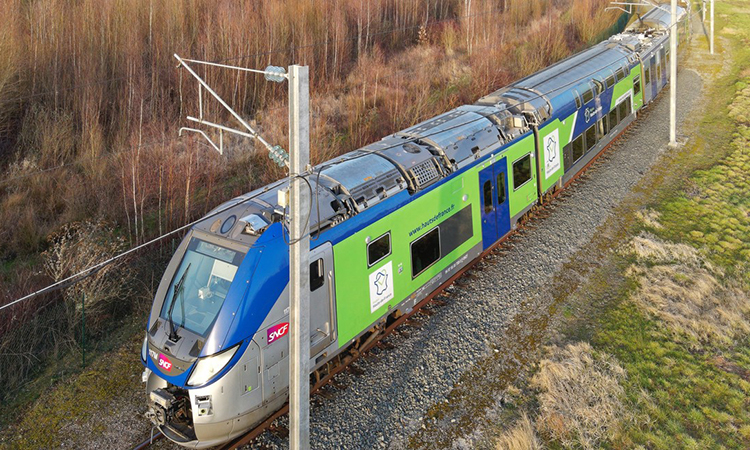France’s autonomous regional train prototype begins operation testing
Posted: 24 May 2021 | Global Railway Review | No comments yet
SNCF and its partners have begun testing a modified Regio 2N regional train as a prototype autonomous regional train for France’s rail network.


Credit: Alstom/ Samuel Dhote.
Two and a half years after a consortium was launched to develop the prototype of an autonomous regional train in France, SNCF and its partners Alstom, Bosch, Spirops, Thales and the Railenium Technology Research Institute have put their test train into operation.
At the start of the year, a Regio 2N regional train was modified and equipped for the purpose of the trials by the Alstom site in Crespin (formerly Bombardier). Various sensors, cameras, radars and lidars (laser detection) were fitted to collect essential data for the project.
The first trials took place over one week, at the beginning of March 2021, between Aulnoye and Busigny and between Busigny and Calais (in the North of France). The Regio 2N regional train prototype ran on a commercial track, with the project’s engineers and technicians on board.
The trials included tests of:
- The perception and recognition systems for the signals located along the track
- The geolocation system, particularly by satellite, which provides the precise position of the train.
During this first phase of trials, the sensors and equipment of these new systems that were specially fitted on the train were activated for the purpose of observing how they work, but they did not interfere with the movement of the train. The prototype was driven by an SNCF driver who specialised in operating under test conditions.
At the end of the first week of trials, tests were conducted at the CEF railway test centre in Petite-Forêt, near Valenciennes, to test the train’s autonomous operation system, which makes it possible to automate the acceleration and braking of the train.
From 17 to 21 May 2021, following the tests carried out at the CEF railway test centre, a second series of trials were scheduled to fine-tune the operating system of the train prototype. These new trials took place on the national railway network at Busigny (in the North of France) and will lead, in the coming months, to semi-autonomous operation in the trial phase.
Semi-autonomous operation makes it possible to automate the acceleration and braking of the train, supervised by a driver. However, these trials are a key step towards achieving the consortium’s ultimate objective: achieving full autonomy by 2023.
The trials, authorised by the French National Railway Safety Authority (EPSF), will help to substantiate the safety demonstration required for the train’s future authorisation to operate. As an observer in the project, EPSF will be in a position to assess the understanding of the technologies developed and their impact on the railway system, as well as any possible regulatory changes needing to be made for this new type of operation.
Cyber-security issues, which are crucial for the autonomous train, have been taken into consideration from the start of the project. The project partners are working closely with ANSSI (Agence Nationale de la Sécurité des Systèmes d’Information), the French national cyber-security authority.
This Regio 2N regional train will be used over the next two years as a prototype of France’s autonomous passenger train. The train will be tested on the track between Aulnoye and Busigny, during the school holidays.
Outside of the research and test periods, the Regio 2N regional train, an activity of SNCF Voyageurs, will be in regular commercial service, transporting passengers. During these commercial trips, in conventional driving mode, it will record data that will improve the performance of the signal recognition algorithms by detecting, for example, the colour of the traffic lights and the surrounding environment of the train.
At the same time, laboratory work is being carried out on trial simulators at the sites of all of the consortium partners to fine-tune the itineraries of the test train and further develop the automated system.
“Our project has just passed a significant milestone with great success. Another step has been taken towards achieving autonomy in rail. The mobilisation of the SNCF teams and of our partners allows us to explore all of the issues, both human and technological. With our research work and trials, we are making progress in the rail sector and preparing for its future development,” said Pierre Izard, Director of Technology, Innovation and Group Projects at the SNCF Group.
Jean-Baptiste Eyméoud, President of Alstom France, said: “Alstom is particularly proud to have helped to reach a new milestone for autonomous operation in France, following the first run of a semi-autonomous freight train on the French national railway network in October 2020. With more than 50 years of experience, Alstom has been offered, with this project of autonomous train for passengers, a new major opportunity to enhance its skills and innovations in the field of rail automations and autonomous transport, thereby developing its leadership in new forms of autonomous and digital mobilities.”
Related topics
Automatic Train Operation/Autonomous Train Control (ATO/ATC), Digitalisation, Operational Performance, Rolling Stock Orders/Developments, Signalling, Control & Communications, Technology & Software
Related organisations
Agence Nationale de la Sécurité des Systèmes d'Information (ANSSI), Alstom, Bosch, French National Railway Safety Authority (EPSF), Railenium Technology Research Institute, SNCF, SNCF Voyageurs, Spirops, Thales







